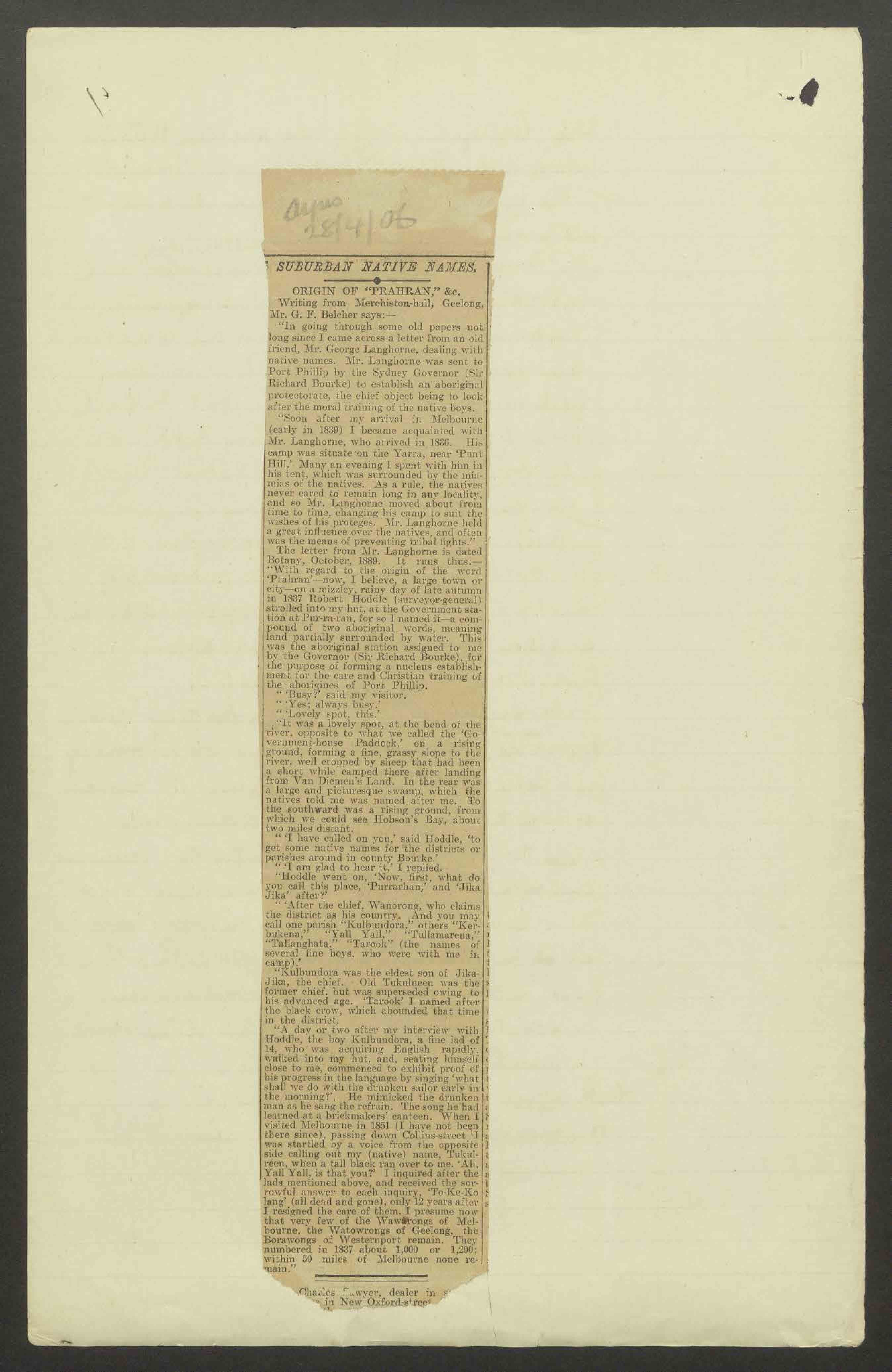Notes by Howitt on Kulin from Barak

Transcription - Page 97
[newspaper letter]
Argus
28/4/06
Suburban Native Names
Origin of “Prahran,” &c.
Writing from Merchiston-Hall, Geelong,
Mr. G. F. Belcher says: -
“In going through some old papers not
long since I came across a letter from an old
friend, Mr George Langhorne, dealing with
native names. Mr Langhorne was sent to
Port Phillip by the Sydney Governor (Sir
Richard Bourke) to establish an aboriginal
protectorate, the chief object being to look
after the moral training of native boys.
“Soon after my arrival in Melbourne
(early in 1839) I became acquainted with
Mr Langhorne, who arrived in 1836. His
camp was situate on the Yarra, near “Punt
Hill.’ Many an evening I spent with him in
his tent, which was surrounded by the mia-
mias of the natives. As a rule, the natives
never cared to remain long in any locality,
and so Mr Langhorne moved about from
time to time, changing his camp to suit the
wishes of his proteges. Mr Langhorne held
a great influence over the natives, and often
was the means of preventing tribal fights.”
The letter from Mr Langhorne is dated
Botany, October, 1889. It runs thus: -
“With regard to the origin of the word
‘Prahran’ – now, I believe, a large town or
city – on a mizzley, rainy day of late autumn
in 1837 Robert Hoddle (surveyor-general)
strolled into my hut, at the Government sta-
tion at Pur-ra-ran, for so I named it - a com-
pound of two aboriginal words, meaning
land partially surrounded by water. This
was the aboriginal station assigned to me
by the Governor (Sir Richard Bourke), for
the purpose of forming a nucleus establish-
ment for the care and Christian training of
the aborigines of Port Phillip.
“ ‘Busy? said my visitor.
“ ‘Yes; always busy.’
“ ‘Lovely spot, this.’
“It was a lovely spot, at the bend of the
river, opposite to what we call the 'Go-
vernment-house Paddock,’ on a rising
ground, forming a fine, grassy slope to the
river, well cropped by sheep that had been
a short while camped there after landing
from Van Diemen’s Land. In the rear was
a large and picturesque swamp, which the
natives told me was named after me. To
the southward was a rising ground, from
which we could see Hobson’s Bay, about
two miles distant.
“ ‘I have called on you,’ said Hoddle, ‘to
get some native names for the districts or
parishes around in county Bourke.’
“ ‘I am glad to hear it,’ I replied.
“Hoddle went on, ‘Now, first, what do
you call this place, ‘Purrarhan,’ and ‘Jika
Jika’ after?’
“ ‘After the chief, Wanorong, who claims
the district as his country. And you may
call one parish “Kulbundora,” others “Ker-
bukena,” “Yall Yall.” Tullamarena,"
"Tallanghata." "Tarook" (the names of
several fine boys, who were with me in
camp).’
“Kulbundora was the eldest son of Jika-
Jika, the chief. Old Tukulneen was the
former chief, but was superseded owing to
his advanced age. ‘Tarook’ I named after
the black crow, which abounded that time
in the district.’
“A day or two after my interview with
Hoddle, the boy Kulbundora, a fine lad of
14, who was acquiring English rapidly,
walked into my hut, and, seating himself
close to me, commenced to exhibit proof of
his progress in the language by singing ‘what
shall we do with the drunken sailor early in
the morning?’ He mimicked the drunken
man as he sang the refrain. The song he had
learned at a brickmakers’ canteen. When I
visited Melbourne in 1851 (I have not been
there since), passing down Collins-street I
was startled by a voice from the opposite
side calling out my (native) name, Tukul-
reen, when a tall black ran over to me. ‘Ah,
Yall Yall, is that you?’ I inquired after the
lads mentioned above, and received the sor-
rowful answer to each inquiry, ‘To-Ke-Ko
lang’ (all dead and gone), only 12 years after
I resigned the care of them. I presume now
that very few of the Wawarongs of Mel-
bourne, the Watowrongs of Geelong, the
Borawongs of Westernport remain. They
numbered in 1837 about 1,000 or 1,200;
within 50 miles of Melbourne none re-
main.”
Document Details
